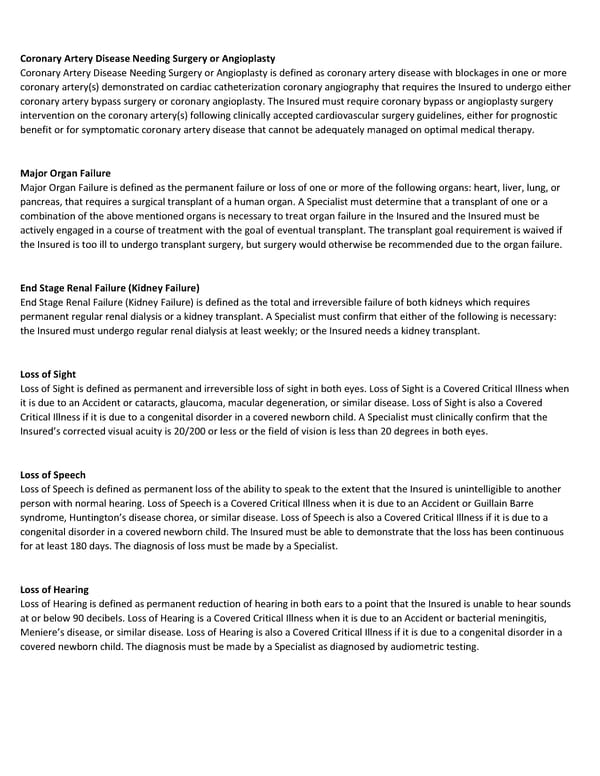Coronary Artery Disease Needing Surgery or Angioplasty Coronary Artery Disease Needing Surgery or Angioplasty is defined as coronary artery disease with blockages in one or more coronary artery(s) demonstrated on cardiac catheterization coronary angiography that requires the Insured to undergo either coronary artery bypass surgery or coronary angioplasty. The Insured must require coronary bypass or angioplasty surgery intervention on the coronary artery(s) following clinically accepted cardiovascular surgery guidelines, either for prognostic benefit or for symptomatic coronary artery disease that cannot be adequately managed on optimal medical therapy. Major Organ Failure Major Organ Failure is defined as the permanent failure or loss of one or more of the following organs: heart, liver, lung, or pancreas, that requires a surgical transplant of a human organ. A Specialist must determine that a transplant of one or a combination of the above mentioned organs is necessary to treat organ failure in the Insured and the Insured must be actively engaged in a course of treatment with the goal of eventual transplant. The transplant goal requirement is waived if the Insured is too ill to undergo transplant surgery, but surgery would otherwise be recommended due to the organ failure. End Stage Renal Failure (Kidney Failure) End Stage Renal Failure (Kidney Failure) is defined as the total and irreversible failure of both kidneys which requires permanent regular renal dialysis or a kidney transplant. A Specialist must confirm that either of the following is necessary: the Insured must undergo regular renal dialysis at least weekly; or the Insured needs a kidney transplant. Loss of Sight Loss of Sight is defined as permanent and irreversible loss of sight in both eyes. Loss of Sight is a Covered Critical Illness when it is due to an Accident or cataracts, glaucoma, macular degeneration, or similar disease. Loss of Sight is also a Covered Critical Illness if it is due to a congenital disorder in a covered newborn child. A Specialist must clinically confirm that the Insured’s corrected visual acuity is 20/200 or less or the field of vision is less than 20 degrees in both eyes. Loss of Speech Loss of Speech is defined as permanent loss of the ability to speak to the extent that the Insured is unintelligible to another person with normal hearing. Loss of Speech is a Covered Critical Illness when it is due to an Accident or Guillain Barre syndrome, Huntington’s disease chorea, or similar disease. Loss of Speech is also a Covered Critical Illness if it is due to a congenital disorder in a covered newborn child. The Insured must be able to demonstrate that the loss has been continuous for at least 180 days. The diagnosis of loss must be made by a Specialist. Loss of Hearing Loss of Hearing is defined as permanent reduction of hearing in both ears to a point that the Insured is unable to hear sounds at or below 90 decibels. Loss of Hearing is a Covered Critical Illness when it is due to an Accident or bacterial meningitis, Meniere’s disease, or similar disease. Loss of Hearing is also a Covered Critical Illness if it is due to a congenital disorder in a covered newborn child. The diagnosis must be made by a Specialist as diagnosed by audiometric testing.
 Critical Illness Benefits Summary Page 3 Page 5
Critical Illness Benefits Summary Page 3 Page 5